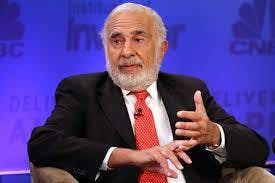Gist of Financial Mantras by Investment Tycoons
Detailed investment advices by century's gretest investors and their major take on global financial markets
Words by great investors of the century
Warren Buffet

Don't let world events affect your investing decisions: Warren Buffet emphasizes that investors should not let the news of the day or short-term market fluctuations affect their long-term investment strategy. Investors should focus on the fundamentals of the companies they are investing in and not let the noise of the market distract them from their long-term goals.
Don't invest in something you don't understand: Buffet has famously said that "never invest in a business you cannot understand." This means that investors should only invest in companies or industries that they have a good understanding of. Investing in something you don't understand can lead to poor investment decisions and a lack of ability to evaluate the risks involved.
Don't follow the herd: Buffet advises investors to not blindly follow the crowd and invest in popular stocks or industries just because everyone else is doing it. This can lead to buying overvalued stocks and selling undervalued ones. Instead, investors should do their due diligence and make informed decisions based on their own research and analysis.
Don't try to time the market: Buffet is famously against market timing, which means trying to buy and sell stocks based on short-term market fluctuations. Buffet believes that trying to time the market is a losing strategy and that investors should focus on long-term investing. Instead of trying to time the market, investors should focus on investing in high-quality companies with strong fundamentals.
Don't let emotions cloud your judgment: Buffet advises investors to not let their emotions affect their investment decisions. Fear and greed can lead to poor investment decisions, such as buying or selling stocks based on emotions rather than on sound analysis. Investors should remain disciplined and stick to their long-term investment strategy, even during times of market volatility or uncertainty.
Books By Warren Buffet
Peter Lynch

Don't blindly follow the crowd: Lynch advises investors not to follow the crowd and instead to do their own research and analysis before investing.
Don't ignore a company's financials: Lynch recommends that investors pay attention to a company's financial statements, including its earnings, cash flow, and debt levels.
Don't try to time the market: According to Lynch, trying to time the market is a losing strategy, as it is impossible to predict short-term stock price movements.
Don't get too attached to a stock: Lynch advises against developing an emotional attachment to a stock, as this can cloud an investor's judgment and lead to poor decision-making.
Don't invest in a company you don't understand: Lynch stresses the importance of investing only in companies that you understand and that have a clear, understandable business model.
Books by Peter Lynch
Jim Simmons

Don't believe that you can predict the future.
Don't try to time the market.
Don't be emotional about your investments.
Don't let your political beliefs influence your investment decisions.
Don't ignore the power of diversification.
Don't ignore the importance of risk management.
Books By Jim Simmons
Rakesh Jhunjhunwala

Buy right, sit tight: Jhunjhunwala believes in buying the right stocks and holding them for a long time. He emphasizes the importance of analyzing a company's fundamentals and buying at the right price, and then having the patience to let the investment grow over time.
Avoid short-term trading: Jhunjhunwala advises against short-term trading, as it requires timing the market perfectly, which is difficult for even the most experienced investors. Instead, he recommends focusing on fundamental analysis and investing for the long-term.
Don't let emotions rule your investment decisions: Jhunjhunwala warns against letting emotions like fear and greed influence investment decisions. He suggests sticking to a well-planned investment strategy and avoiding panic-selling during market downturns.
Diversify your portfolio: Jhunjhunwala believes in diversifying investments across different sectors and asset classes. This helps to spread risk and maximize returns. He also advises against putting all your eggs in one basket and investing in a single stock.
Focus on quality management: Jhunjhunwala emphasizes the importance of investing in companies with competent and trustworthy management. He believes that a company's management can make or break its success and recommends thoroughly researching a company's management team before investing.
Books on Rakesh Jhunjhunwala
The Warren Buffett of India Rakesh Jhunjhunwala: The Big Bull of Indian Share Market
The Big Bull of Dalal Street: How Rakesh Jhunjhunwala Made His Fortune
Ray Dalio

Don't make big bets based on past trends.
Don't put all your eggs in one basket.
Don't be overconfident in your abilities to predict the future.
Don't ignore the impact of taxes and inflation on your investments.
Don't invest without first understanding the risks involved.
Books by Ray Dalio
Saurabh Mukherjea

Invest in high-quality companies: Mukherjea advises investors to focus on investing in high-quality companies with strong fundamentals. Such companies are typically leaders in their respective industries and have a track record of consistent growth and profitability.
Avoid investing in cyclical businesses: Mukherjea recommends avoiding companies that are heavily dependent on the economic cycle, as their earnings tend to be volatile. Instead, he suggests investing in companies with a more stable earnings profile.
Invest in companies with a moat: Mukherjea believes that companies with a competitive advantage or a "moat" are better positioned to generate sustainable returns over the long term. A moat could be in the form of a strong brand, a high entry barrier, or a unique business model.
Don't chase returns: Mukherjea warns against chasing high returns without considering the risks involved. He suggests focusing on risk-adjusted returns and investing in companies with a good track record of capital allocation.
Have a long-term perspective: Mukherjea advises investors to have a long-term perspective when it comes to investing. He suggests avoiding short-term market noise and focusing on the underlying fundamentals of the companies in which you invest. By having a long-term perspective, investors can ride out short-term volatility and benefit from the compounding effect of returns over time.
Books by Saurabh Mukherjea
Benjamin Graham

Benjamin Graham was a renowned investor and author who is widely regarded as the father of value investing. He is perhaps best known for his book "The Intelligent Investor," which has become a classic guide to investing.
Here are some of Benjamin Graham's top investment tips:
Invest in companies, not stocks: Graham believed that investing in individual stocks was more important than buying stocks as a whole. He advised investors to focus on the underlying business, its financials, and the company's management.
Look for undervalued stocks: Graham believed that the stock market was not always efficient and that it was possible to find stocks that were undervalued by the market. He suggested looking for companies with low price-to-earnings ratios, low price-to-book ratios, or high dividend yields.
Invest for the long term: Graham believed that investors should have a long-term perspective and be patient with their investments. He suggested holding onto stocks for at least five years, if not longer.
Diversify your portfolio: Graham advocated for diversification as a way to manage risk. He suggested investing in a variety of stocks across different industries and sectors.
Don't follow the crowd: Graham believed that investors should think independently and not be swayed by the opinions of others. He cautioned against following market trends or popular stocks without doing your own research.
Use a margin of safety: Graham believed in the concept of a "margin of safety," which meant investing in stocks that were priced below their intrinsic value. He suggested buying stocks with a significant discount to their true worth, which would provide a cushion against potential losses.
Books By Benjamin Graham
George Soros

He is one of the most successful investors in modern history, has shared several investment tips over the years. Here are some of his top investment tips:
Good investing is boring. Soros has said that successful investing should be dull and not exciting. Investors should not look for the next big thing but rather focus on sound investments that have a proven track record.
Recognize your mistakes. Soros has said that he is only rich because he knows when he is wrong and recognizes his mistakes. Successful investors are not perfect and will make mistakes, but it is important to learn from them and move on.
Time your investments. Soros has said that timing is everything when it comes to investing. Investors should not only focus on what to buy, but also when to buy and sell.
Be patient. Soros has advised investors to be patient and wait for the right opportunity to invest. He has said that it is better to wait and do nothing than to invest at the wrong time.
Diversify your portfolio. Soros has emphasized the importance of diversification in investing. Investors should spread their investments across different asset classes and markets to reduce risk.
Follow your own strategy. Soros has said that investors should have their own strategy and stick to it. They should not be influenced by the opinions of others or market trends.
Take risks. Soros has said that successful investing requires taking risks. Investors should not be afraid to take bold investment decisions, but they should always manage their risk carefully.
Book on George Soros
Carl Icahn

He is a well-known investor and businessman who has been shaking up corporate America for decades. He has shared several investment tips over the years, and some of the top tips are:
Invest in undervalued assets: According to Icahn, stocks and investments are not perfect and sometimes are priced lower than their actual value. He believes the trick to becoming successful is to invest in undervalued assets.
Study business potential before investing: Icahn believes in studying a company's potential before investing in it. He advises investors to do their homework and understand the business, its products, and the industry before investing.
Be bold and avoid cardinal sins: Icahn recommends that investors should be bold and take risks. He advises against cardinal sins such as greed, impatience, and ignorance.
Be a long-term investor: Icahn believes in being a long-term investor. He advises investors to hold their investments for the long term instead of getting in and out of positions frequently.
Books on Carl Icahn
Vijay Kedia

He is an Indian investor who believes in the SMILE investing philosophy, which stands for Small in size, Medium in experience, Large in desire, and Extra-large in market potential. Kedia suggests it is always good to invest for a minimum of 5 years and to have a balanced approach. According to Kedia, it is not good to be overly optimistic during an upward trend and very pessimistic in a downtrend. He advises his followers to gamble big and ride out the storm. Kedia also emphasizes placing a stop-loss while trading, as without stop loss, a trader cannot survive in the market. Finally, Kedia thinks that a person should invest in companies with nice and transparent management, and to always look for the qualitative factors of the company. He advises against investing to earn bread.
Radhakishan Damani

Mr. Damani is a veteran Mumbai investor and the founder of Avenue Supermarkets, which runs more than 200 DMart stores in India. His investing style includes a long-term view, buying quality stocks with strong fundamentals, diversifying the portfolio, and rebalancing the portfolio on a prompt basis. He has also been successful in investing in the stock market, and his portfolio includes popular companies such as 3M India Ltd, United Breweries Ltd, VST Industries Ltd, and more.
Here are Radhakishan Damani's top investment tips in detail:
Invest for the long-term: Damani believes in investing for the long term and holding onto quality stocks. Investors must identify companies with strong fundamentals and a sustainable business model that can generate steady growth over time.
Focus on buying quality stocks: According to Damani, it's essential to focus on buying quality stocks that have a proven track record of generating consistent profits and cash flows. Investors should look for companies with a competitive advantage, a strong brand, and a solid balance sheet.
Diversify your portfolio: Damani stresses the importance of diversification in an investment portfolio. Investors should avoid putting all their eggs in one basket and spread their investments across different sectors and asset classes.
Rebalance your portfolio regularly: Damani recommends rebalancing your portfolio on a prompt basis to maintain the desired asset allocation. This means selling the assets that have become overvalued and investing in those that have become undervalued.
Stay disciplined: Lastly, Damani advises investors to stay disciplined and not get swayed by market fluctuations or rumors. They should stick to their investment strategy and have the patience to reap the benefits of compounding over the long term.
Books on Mr. Damani
Mohnish Pabrai

Mohnish Pabrai, a renowned value investor and author, has shared several investment tips over the years. Here are some of his top investment tips:
Bet on the one at the helm when the company is small. Despite the higher risk factor, investors are drawn to smaller companies because of their growth potential. Pabrai recommends investing in small companies with promising management teams that have a track record of success, and who are inherently frugal.
Focus on buying an existing and well-understood business with an ultra-slow rate of change. Pabrai suggests that investors should invest in companies that have a simple and understandable business model, with a low rate of change. This helps to minimize the risk and uncertainty that comes with investing in complex businesses.
Patience and waiting are the single biggest advantages a value investor has. Pabrai highlights the importance of patience in investing. He suggests that investors should wait for the right opportunities and not be in a hurry to buy stocks. In the long run, waiting for the right investment opportunity can lead to higher returns.
Use a checklist approach to investing. Pabrai believes in using a checklist to evaluate investment opportunities. The checklist approach helps investors to remain disciplined and objective in their investment decisions, and avoid impulsive decisions.
Cloning successful investors can be a profitable strategy. Pabrai suggests that investors can learn from successful investors such as Warren Buffett and Charlie Munger by cloning their investment strategies. Cloning involves studying the investment decisions of successful investors and copying them.
Book by Mohnish Pabrai
My personal take on investments
Never Mix Insurance & Investment
Most of us end up buying an Insurance + Investment product either because it is sold to us aggressively or we get attracted to the tax free / guaranteed maturity of the product.
The truth is, these products neither give you insurance advantage nor investment advantage. ULIPs can generate slightly higher returns over traditional policies but has a 5 years lock-in & most ULIPs have a very high cost (3%-4%). If you invest in Equity Mutual Funds instead, your returns would be much higher and there are no restrictions on withdrawal or lock-ins unlike with ULIPs.
Fixed Income is for Capital Protection & Not Chasing Returns
Everyone wants higher returns but trying to do that in Fixed income can be fatal. Unlike Equity where the price goes down and there is a probability of the price coming back up, anywhere in fixed income when you are offered higher returns understand that the risk is high. Avoid investing in bonds of companies that you have not even heard of just because it is offering you higher returns
Don't Invest in Products You Don't Understand
It's a myth that direct equity generates more returns than equity mutual funds. Most investors I meet would have been better doing MFs over direct equity because they don't know why they have bought what they have bought. Try & stick to Mutual Funds for the transparency, data availability and strong regulation & most importantly the track record
Disclaimer
Any information or communication I provide is for educational or informational purposes only and should not be construed as investment advice. It is important to conduct your research and seek the advice of a professional financial advisor before making any investment decisions. Any investment you make is solely at your own risk, and I am not liable for any losses or damages that may occur as a result of your investment decisions.
